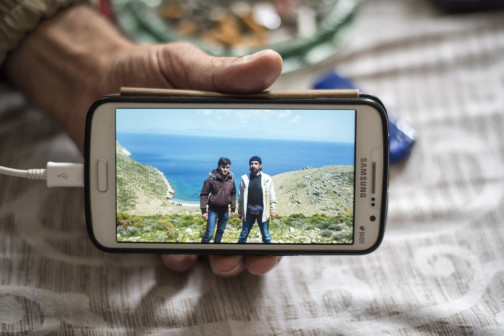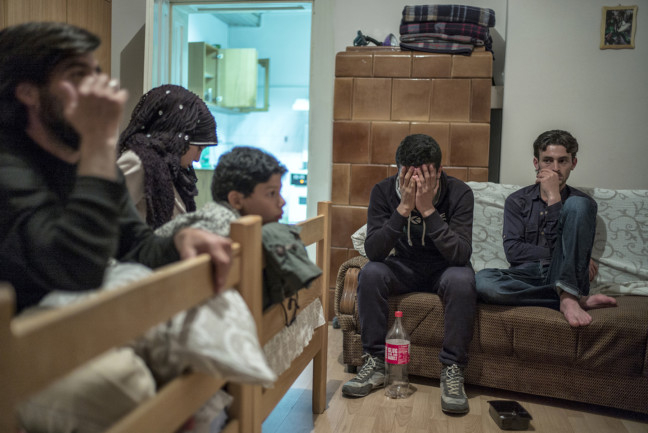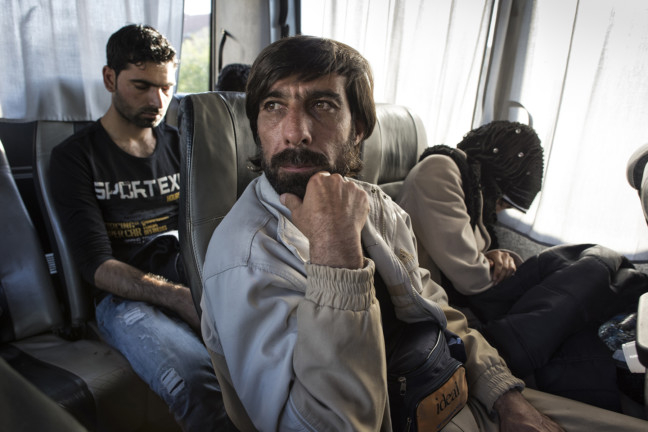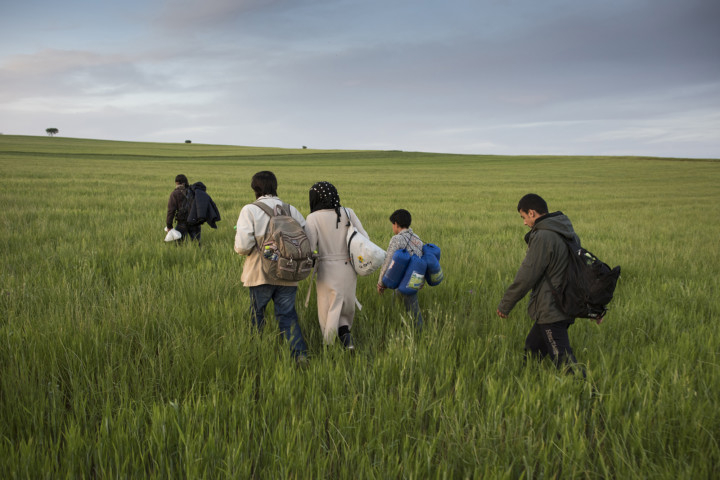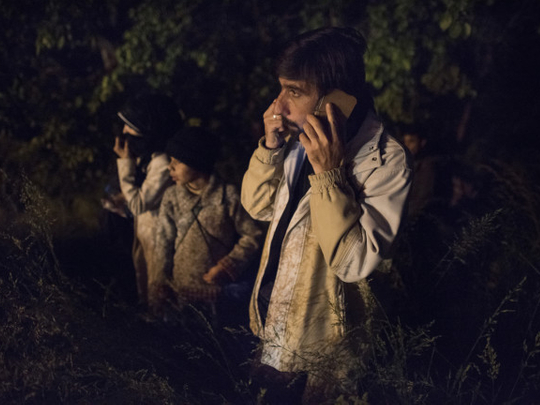
Evzonoi, Greece: They’ve made it 2,574km by boat, train, car and on foot. Now the light is fading as they finally reach the edge of Greece.
“Let’s move,” Ahmad Jinaid beckons, his family trailing him up a hill in high grass. But then he stops.
He is standing beside an abandoned watchtower near the northern border, the one after which there’s supposed to be no talking and, worse for a man with a weakness for Winstons, no smoking. The 42-year-old former deliveryman squints at his white Samsung Galaxy phone.
He is looking for directions.
“No, no, no,” he mutters, blinking at the glowing screen. “What happened to the GPS?”
Ahmad is eight weeks out of Syria, part of a historic exodus of Arabs, Africans and Asians fleeing war and oppression. More than 102,000 migrants have risked the Mediterranean Sea to reach Europe this year, outpacing even 2014’s record arrivals.
Many land in Italy, but a surging number of migrants are coming ashore in Greece. From there, they venture north through the Balkans to the rest of the European Union — a web of perilous trails stretching hundreds of miles. Aid workers have nicknamed it the Black Route. Ahmad had meticulously plotted the trek on his phone’s GPS.
On a steep hill ahead, the gaudy glow of red neon burns. That’s Macedonia and the casino town they need to avoid. Gangs armed with guns and lead pipes roam the woods, beating and robbing migrants. There are corrupt police on the route. Heat-seeking cameras. Mountains. Wolves.
Ahmad is limping from days of walking. A mysterious pain is knifing through his back. The untreated goiter on his neck — the one he tries to hide with his jacket collar — is throbbing.
He taps the Samsung screen again. It’s frozen.
His smartphone. It cost $275 (Dh1,010) on the black market back in Aleppo, just shy of three months’ salary. His compass. Lodestar. A lifeline for the modern migrant, who journeys to the First World by the grace of the mobile internet.
“Uncle,” whispers Marwa Jinaid, Ahmad’s shy 19-year-old niece. A kindergarten teacher with flawless copper skin who is used to afternoons colouring with kids, she lets go of the hand of her 11-year-old brother, Mohammad. He’s the family comedian, the kid who endured the past few years of war in Syria by watching Tom & Jerry cartoons in Arabic. But he has suddenly run out of jokes. And Marwa is hugging herself in a beige winter coat despite the warm spring night.
Bandits, she knows, are capable of more than thievery.
“Uncle,” Marwa says again, on the verge of tears.”What are we going to do?”
Ahmad is taking his niece and nephew to their father, Esmail, who fled Syria last year and is now living in a pastel village called Gmnd in Austria. Theirs is a journey prompted by the desperation of war. It also reflects the dysfunction of the European Union.
That’s because many of the Syrians and Iraqis landing in Greece stand a good chance of qualifying for legal asylum. But there is little work and few prospects for aid in this bankrupt country. Farther north, in promised lands such as Austria, France, Germany and Sweden, asylum means shelter, a generous stipend and the prospect of a good job. The European Union, however, offers no safe passage there. Hence the Black Route.
Ahmad Jinaid stows his smartphone.
“You’ll see your father soon,” he says, looking reassuringly at Marwa and Mohammad. He motions to two others to follow: his brother-in-law, who has tagged along on the journey, and a Syrian teen they took in along the way.
“It’s OK,” Ahmad says. “God will guide us.”
Twenty days before arriving at the Macedonian border, Ahmad, along with his niece, nephew and brother-in-law, had disembarked from a 15-metre pleasure cruiser on the shore of a tiny Greek island, Tilos.
Seventy-five people had been herded into the boat meant for 30. Each adult paid the Ukrainian smugglers $2,000 for the 12-hour trip from Turkey.
Ahmad and his brother, Esmail, had already sold virtually everything of value they owned to help finance the trip. Esmail’s two cars. Ahmad’s delivery truck. After paying smugglers, Ahmsd had a few thousand euros left.
If things went precisely as planned, it might just be enough.
Sense of relief
On shore that day, there was a sense of relief. Finally, they had made it to Greece. Europe! A sunny pebble beach alongside the crystalline Aegean. Marwa — after spending her sea journey pale and vomiting — smiled under her black-and-silver headscarf. Mohammad played cat-and-mouse with the waves, giggling as the water caught his sneakers. Looking up, he flashed a grin at his Uncle Ahmad, who was recording the scene on his phone.
Their father had not wanted his children to come this way. A maths teacher before his school closed due to bombings, Esmail Jinaid had travelled from Aleppo to Austria, figuring he would seek asylum and bring over his family with proper visas.
But the plan fell apart. Esmail was only granted temporary status, which didn’t allow him to sponsor his family. So he decided to game the system. If 11-year-old Mohammad could get to Austria, he could file for asylum. As a minor, he could petition to bring in his mother, who would then try to sponsor his 16-year-old brother.
More and more desperate Syrians like the Jinaids were pouring into Greece. They were hardly welcome. On the much larger neighbouring island of Kos, overwhelmed with more than 7,000 migrants in the first four months of the year, arrivals were being crammed into a fetid husk of a hotel with no working toilet, no electricity and halls piled with rotting food.
But on Tilos, population 299, it was different. Marwa and Mohammad got clean sleeping mats inside an old Orthodox monastery that serves as the island’s refugee camp. Ahmad and his brother-in-law, Mustafa Haj Mohammad, 27, slept under the stars, with blankets and cushions. That night, a British retiree came over and cooked them a hearty lentil stew.
Within days, the family boarded a ferry to Athens, where they would await instructions from their smuggler. They had paid him over $12,000 in Turkey. He was a Syrian, recommended by other migrants. The man who could get them to Austria.
Three weeks after landing in Tilos, Ahmad and his family were sitting at an outdoor cafe in the northern Greek town of Evzonoi, their backpacks strewn by their feet. The Hara restaurant was a staging ground for migrants, mostly Syrians, trying to make it through nearby Macedonia. Men compared maps and listened to tips from those who — attacked by bandits — had limped back into Greece.
Ahmad, nursing the pain in his back with an occasional rub, looked worn out. Marwa, Mustafa and Mohammad quietly sipped soft drinks and water, barely touching the turkey pizza on the table. They had made it about 965km through Greece, and the worst part, they knew, was just ahead.
Now a stranger came by, pulling up an empty chair. For a fee, the man said, he could get them across the border.
Ahmad declined. He’d had his fill of smugglers.
Their own smuggler had instructed them to take a train from Athens to the northern Greek city of Thessaloniki. They were to travel with another of the man’s clients, Ahmad Abed Elhai, a 17-year-old from Damascus. Someone, the smuggler said, would meet them all at the station.
But when the train pulled in to Thessaloniki, there was no one.
They called.
‘Lost the money to the smuggler’
The smuggler’s number was no longer in service.
“Since I lost the money to the smuggler, all the family back home blames me,” Ahmad was now saying, fiddling with his can of Coke. “I don’t think about tomorrow now. I just think about what we need to do next.”
What he did next: Outside the train station in Thessaloniki, Ahmad had paid a taxi driver 300 euros (Dh1,232), to take the five of them to the Macedonian border, 83km north.
After ten minutes, the cabbie told them to get out.
Then they hiked along train tracks for two days, nearly getting hit.
Finally, the family had arrived at Evzonoi, a 90-minute walk from the Macedonian border. The 17-year-old they had travelled with now sat by Ahmad Jinaid’s side, helping him to plot a safe course on the smartphone. A gentle young man with perfectly straight, absolutely white teeth, Elhai wanted to go to Germany to become a dentist.
The older Ahmad began to swipe through photos on his phone. There was his younger brother Khalid, back in Syria, confined to a wheelchair after a stray bullet hit his spine. Ahmad wondered when he would see him again.
Then he looked at one last photo. It showed two of his boys, ages eight and nine.
He had left them at home near Aleppo, along with his three daughters, his infant son and his wife, who was still recuperating from a bullet wound from a sniper. Ahmad wanted to get his family out legally, once he arrived in Austria. But with all the trouble his brother was having, Ahmad fretted it wouldn’t work.
“You must understand,” he said, turning away, embarrassed by his tears. “I love my brother more than myself. He needs me to bring his children. If I have to go back the same way I came for my own family, I still need to do this for him.”
He dried his eyes. If they were lucky, they could cross Macedonia in two days and reach Serbia.
Five days later, a Tito-era clunker of a train lurched into Track 2 at Belgrade Central. Hundreds of glassy-eyed migrants started to jump off the train even before it came to a full stop.
Five figures moved among the disembarking passengers. Huddled together, they looked spent. But they were still alert enough to spot a Serbian cop. Uncle Ahmad and the others instinctively lowered their heads.
After their trek in the wilds of Macedonia, the city of Belgrade, its cars honking, its streetcars dinging, was disorienting. Mustafa drifted onto the street. An oncoming car swerved as Ahmad yanked his young brother-in-law back by his shirtsleeves. Mustafa registered the near miss with a dull gaze.
The family was silent.
“We would only die once in Syria,” Ahmad finally said. “Here we are dying 5,000 times.”
They had 72 hours to leave Serbia. That was according to the papers that officials are giving nearly all refugees caught crossing the border from Macedonia. The family spotted a spare, grimy flophouse charging $11. The Jasmin Hostel.
Ahmad stepped into their room, gingerly removing his shoes and peeling off his disintegrated socks. His feet, covered with walnut-size blisters, seemed somehow bent. He leant back on the hard mattress, wincing from the mysterious pain in his side, and fished for a Winston. Then he lit up, closing his eyes, exhaling thankfully.
“You won’t believe what we’ve been through,” Ahmad said.
On their first night, he said, they hiked through the forest. A wolf tracked them for hours.
“I prayed,” Marwa interjected.
The second night, they walked dozens of miles more. And then they encountered the fellow migrant who delivered the news: They had effectively walked in a circle. So Ahmad put the family on a train to the Macedonian capital of Skopje.
“I thought we would make it,” Ahmad said, studying his Winston. But when they got off the train, the conductor pointed them out to the police.
They were hauled off to a prison-like encampment and locked in a cell with 24 other would-be refugees — mostly men. The next morning, the police drove them to a village near the Serbian border, then instructed them to follow a man who would take them the rest of the way. He instead took them to a house where they were held by a gang.
“They demanded 400 euros per person, just to let us go,” Ahmad said. The gang finally accepted half.
The family crossed the Serbian border, where the next batch of police hauled them in. They photographed the group one by one. The cops barked at Marwa to take off her headscarf. The male officers watched as she was forced to reveal her dark hair.
“She cried,” Ahmad said.
He reached for another Winston, cupped it, lit it, then caressed his ruined feet. He had never been so tired. Never felt so defeated. The mood remained dark as they rested in Belgrade for another day.
Marwa, so used to a life around women in Syria, spent much of her time alone in a second room.
Only little Mohammad seemed immune. He hummed catchy Arabic tunes. At one point, sitting on a bed with everyone gathered around, he told a joke about a woman whose dentist warned her off sweets.
“So she went home and started eating sugar with a long spoon! When her husband asked her why, she said, ‘Well, the dentist told me to stay far away from sweets!’ “
He cracked up, hitting the mattress with his hands. The adults offered weak smiles.
The next morning, the family sipped strong coffee in the courtyard of the hostel as they stuffed cookies and bottled water into their backpacks for the bus to the border with Hungary. Just one more country to cross before Austria. But Marwa had reached her limit.
“I need them, please,” she pleaded to her Uncle Ahmad, referring to the sleeping pills she was begging him to buy. “If we get caught again and go to another prison, I want to sleep through it. I have to.”
She had never expected to go on this trip. Ahmad and Mohammad were already en route to the Turkish coast when her father, Esmail, had called her on that April morning. By then, she was living with her mother and brother in central Turkey, where they had escaped after their hometown was attacked by Daesh terrorists.
Esmail had learnt that even if he was granted full asylum, he could not legally bring in Marwa, now 19 and no longer a minor. So there was only one way for her to reach Austria — with his younger brother.
“I never had time to think,” she said.
Without her sleeping pills, which Ahmad refused on the grounds that they were bad for her health, Marwa took Mohammad’s hand as they boarded the bus for Hungary. All but two passengers were Syrian refugees. During the four-hour drive through rolling farmland and drab villages, the migrants studied maps on their cell phones and exchanged travel tips.
Unlike in Serbia, the Hungarians were patrolling for migrants at the border and tossing them in jail before deporting them. Migrants could avoid all that if they filed for asylum in Hungary. But doing so would make it that much harder to claim asylum down the line in other EU countries - such as Austria.
Ahmad had another plan.
A fellow Syrian migrant had contacted him via WhatsApp the night before. “Brother,” he had said in a recorded message. “I am already here in Hungary, and my friend can help you too.” That friend was another smuggler.
If they could get over the border by 5am, to the Hungarian village of Roszke, Ahmad could call the smuggler, who would be waiting in town. For 500 euros each the man could drive them all the way to Vienna.
Ahmad only had half that amount on him. But he would cross that delicate bridge when he came to it. Right now, he had a bigger problem. They had just got off the bus in Kanjiza, the end of the line. And they were being surrounded by the Serbian police.
“All of you,” commanded a Serbian cop in a grey-blue uniform. “Over on the bench, and wait.”
The five of them did as ordered. But as the cops busied themselves with another pair of migrants, Uncle Ahmad quietly got up with the rest of them and made a break for it. Two police cars raced up to them on the road.
Four officers piled out. Their commander swaggered over from a nearby brick building. The Jinaids, it seems, had unwittingly wandered in front of the Kanjiza police station.
“Everyone. Papers. Now,” the commander barked.
Confusion ensued, in part linguistic. Finally, the commander used an interpreter.
“Are you going to a hotel?” he asked. “Are you staying here in Serbia?
“No,” Ahmad answered in Arabic. “We are going to Hungary.”
“Legally?” the commander asked.
“No, illegally,” Ahmad answered. The four others looked at each other with raised eyebrows that asked whether honesty was truly the best policy.
“Uh, OK,” the commander said while casually lighting a cigarette. “Then you’re going the wrong way.”
“It’s that way,” he said, helpfully pointing in the other direction.
For the next hour, they walked and walked. Semi trucks passed, too close for comfort. The five of them finally veered off into the underbrush. Bats flew overhead.
By now, it was 10pm, and they needed to get to Roszke by 5am to call their smuggler. They were only 16km from the village.
They were at a fork. One way went by a river, the other by a road. Even looking at his now-working GPS, Ahmad couldn’t tell which one would get them to the unguarded border crossing they needed to take.
Ahmad chanced a call to their smuggler, a Syrian, who, told him, “Brother, I do not know the Serbian side of the border.”
“God,” the smuggler said, “must be your guide.”
Ahmad chose the river.
He was so close to the smuggler’s car and the final sprint to Austria. To finally delivering Marwa and Mohammad to their father, Esmail Jinaid.
“We will be there by 5am,” Ahmad told the smuggler. “Please do not forget us.”
In the Austrian town of Gmnd, Esmail Jinaid, 47, was trying to concentrate over the din of an Arabic bread factory. It had been two days since Ahmad took his children into Hungary. And still, no word.
His smartphone was on a radiator a few feet away. He glanced at it constantly. But so far, every call had been a false alarm. His worried wife. His worried sister-in-law, Ahmad’s wife. But no word from his children or brother.
The call finally came that evening, when he was sitting in his apartment. But it was the wrong Ahmad. Ahmad Abed Elhai. The 17-year-old the family picked up along the way.
In a crush of information, the teen explained that the family had made it to Roszke an hour before the deadline, but their phone didn’t work. They could not reach their smuggler. They were hiding behind a grocery store in town when a police patrol spotted them.
But Ahmad Jinaid had prepared a backup plan. Older minors seeking refugee status, he knew, were routinely released from jail in Hungary. If the family was detained, he had instructed, Ahmad Abed Elhai should pretend to be little Mohammad’s big brother.
When the 17-year-old was freed, the Hungarians at first refused to release the younger boy to his care, the teen was telling Esmail by phone. But Ahmad Abed Elhai had screamed and yelled, he recalled. He went back the next day to press his demand.
Now, he told Esmail, he had Mohammad. And they were trying to get to Vienna.
The next afternoon, Esmail was walking down the broad boulevards of the former imperial city. He was searching out a small mosque, the agreed meeting place. He turned down a street leading to an immigrant neighbourhood, past kebab shops, baklava bakers. A familiar scent of home. He had spent eight months in Austria, days baking bread, countless night alone, waiting. Now, his son was nearby.
Marwa, Mustafa and Ahmad were still locked in a prison in Hungary.
“I will see only one of my children,” Esmail said as he approached the mosque. “But my brother. My daughter. They are still in jail.”
He knocked once. And the doors to the darkened mosque opened. A ray of light shot in. There was a beaming 11-year-old.
“My darling,” Esmail said, tears streaking his face as his son leapt into his arms. He held him tight.
“Father!” said Mohammad, pulling back, trying to speak.
But Esmail cut him off, hugging him close again, and silently hanging on.


